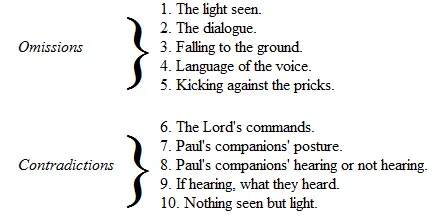Jeremy Bentham - Not Paul, But Jesus
Здесь есть возможность читать онлайн «Jeremy Bentham - Not Paul, But Jesus» — ознакомительный отрывок электронной книги совершенно бесплатно, а после прочтения отрывка купить полную версию. В некоторых случаях можно слушать аудио, скачать через торрент в формате fb2 и присутствует краткое содержание. Жанр: foreign_antique, foreign_prose, на английском языке. Описание произведения, (предисловие) а так же отзывы посетителей доступны на портале библиотеки ЛибКат.
- Название:Not Paul, But Jesus
- Автор:
- Жанр:
- Год:неизвестен
- ISBN:нет данных
- Рейтинг книги:4 / 5. Голосов: 1
-
Избранное:Добавить в избранное
- Отзывы:
-
Ваша оценка:
- 80
- 1
- 2
- 3
- 4
- 5
Not Paul, But Jesus: краткое содержание, описание и аннотация
Предлагаем к чтению аннотацию, описание, краткое содержание или предисловие (зависит от того, что написал сам автор книги «Not Paul, But Jesus»). Если вы не нашли необходимую информацию о книге — напишите в комментариях, мы постараемся отыскать её.
Not Paul, But Jesus — читать онлайн ознакомительный отрывок
Ниже представлен текст книги, разбитый по страницам. Система сохранения места последней прочитанной страницы, позволяет с удобством читать онлайн бесплатно книгу «Not Paul, But Jesus», без необходимости каждый раз заново искать на чём Вы остановились. Поставьте закладку, и сможете в любой момент перейти на страницу, на которой закончили чтение.
Интервал:
Закладка:
xxvi. 9. I verily thought with myself, that I ought to do many things contrary to the name of Jesus of Nazareth. – Which thing I also did in Jerusalem: and many of the saints did I shut up in prison, having received authority from the chief priests; and when they were put to death I gave my voice against them. – And I punished them oft in every synagogue, and compelled them to blaspheme; and being exceedingly mad against them, I persecuted them even unto strange cities. – Whereupon as I went to Damascus with authority and commission from the chief priests , – at midday , O king, I saw in the way a light from heaven , above the brightness of the sun, shining round about me and them which journeyed with me. – And when we were all fallen to the earth, I heard a voice speaking unto me, and saying in the Hebrew tongue , Saul, Saul, why persecutest thou me? it is hard for thee to kick against the pricks. And I said, Who art thou, Lord? And he said, I am Jesus whom thou persecutest. – But rise, and stand upon thy feet: for I have appeared unto thee for this purpose, to make thee a minister and a witness both of these things which thou hast seen, and of those things in the which I will appear unto thee; – delivering thee from the people, and from the Gentiles, unto whom now I send thee.
On comparing the three accounts of Vision 1st, the particulars will be found referable to twelve heads. Under no more than two of the twelve, will the conformity among them be found entire.
Where disconformity has place it may be clear or not clear of contradiction. Clear it may be of contradiction, when it consists either of mere deficiency or mere redundancy, or of both: deficiency or redundancy, according as it is this or that account, which, on the occasion of the comparison, is taken for the standard.
On the occasion in question, such is the importance of the occurrence, that the proper standard of reference and comparison is that which is most ample: that which, if not strictly speaking complete, wants the least of being so. On the part of the historian, speaking in his own person, omission is in such a case without excuse.
Not so, necessarily, in the case of a person whom the historian speaks of as giving that person's own account of that same occurrence. What may be is, that in the nature of the occasion in which the person is represented as speaking of it, there is so much of suddenness, by reason of impending danger, or urgent pressure, that, of the quantity of time necessary for complete utterance, and even of that necessary for complete and correct recollection, more or less was wanting.
On the occasion of that account of the matter, which is the first of the two on which the historian represents Paul as giving an account of this momentous occurrence, – this justification for want of completeness, or this excuse for want of correctness, might naturally enough have place. For it was while pleading for his life at Jerusalem, before a mixed multitude, no inconsiderable part of which were endeavouring at the destruction of it, that Paul is represented as delivering this first of his two accounts: – call that the supposed unstudied or unpremeditated account .
Not so, on the occasion on which he is represented as delivering the second of these same two accounts. On this occasion, it is true, he is represented as pleading in his defence. But it is pleading in and before a regularly constituted judiciary, and after time for preparation in much greater abundance than he could have wished: – call this the supposed studied or premeditated account .
In this view, the proper standard of comparison can not be dubious. The historian being himself, in all three accounts, the immediately reporting witness, and having had his own time for the forming of them all, – that which he gives in his own person, and which therefore naturally occupies the first place, should, in respect of both qualities, as well as in that of clearness, have been, (and, setting aside deceptious design, naturally would have been), as perfect as it was in his power to make it. To the others alone could any excuse be afforded, in respect of any one of those requisites, by any circumstance peculiar to the respective cases.
What is above being observed – Of the ten following instances of disconformity, seven will be found to be cases of simple deficiency, three of contradiction.
In those which are cases of simple deficiency, it will be seen to have urgency for its justification or excuse; for the others there appears no justification or excuse. 5 5 In regard to the matter testified, that is, in regard to the object of the testimony; it is, first of all, a requisite condition, that what is reported to be true should be possible, both absolutely, or as an object of the elaborative Faculty, and relatively, or as an object of the Presentative Faculties, – Perception, External or Internal. A thing is possible absolutely, or in itself, when it can be construed to thought, that is, when it is not inconsistent with the logical laws of thinking; a thing is relatively possible as an object of perception, External or Internal, when it can affect Sense or Self-consciousness, and, through such affection, determine its apprehension by one or other of these faculties. A testimony is, therefore, to be unconditionally rejected, if the fact which it reports be either in itself impossible, or impossible as an object of the representative faculties. But the impossibility of a thing, as an object of these faculties, must be decided either upon physical, or upon metaphysical, principles. A thing is physically impossible as an object of sense, when the existence itself, or its perception by us, is, by the laws of the material world impossible. – Hamilton's Logic 460. – Ed.
Of the twelve distinguishable heads in question, under two alone, viz. that of place and that of time , will the conformity be found complete. Place , a spot near to Damascus, in the roadleading from Jerusalem to Damascus: Time , meaning time of day , – about noon. But, in the quality of trustworthiness deficient as all three accounts will presently be shown to be, it will be seen how little is contributed, by conformity as to the mere circumstances of time and place.
Now then let us see the subjects, in relation to which a want of conformity is observable. To save words, the shortest form of description possible will throughout be employed.

1. Light seen. Between Acts account and Paul's 1st or supposed unstudied account, no disconformity worth remarking. In Acts it is a " light ," in Paul 1st a " great light "; 6in both it is about midday. But in Paul's 2d or supposed studied account, it is above the brightness of the sun at that time of the day.
In Acts the passage is simply narrative: in Paul's 1st, the urgency of the occasion left no room for flowers. But in Paul's 2d, time being abundant, flowers were to be collected, and this is one of them. In the ordinary course of nature there exists not upon earth any light equal in brightness to that of the sun; especially the sun at midday, and in such a latitude. Supposing the light in question ever so much greater than the midday sun, neither Paul nor this his historian could, without a miracle on purpose, have had any means of knowing as much. For a miracle for such a purpose, the existence of any effectual demand does not seem probable. For the purpose mentioned, – namely the bereaving of the power of vision every open eye that should direct itself towards it, – to wit, so long as that same direction should continue, – the ordinary light of the sun would have been quite sufficient. At the time and place in question, whatever they may have been, suppose it true that, though midday was the time, the atmosphere was cloudy, and in such sort cloudy, that without something done for the purpose, a light productive of such effects could not have been produced. Still, for this purpose, a specially created body of light different from that of the sun, and exceeding it in intensity, could not be needful. The removal of a single cloud would have been amply sufficient: – a single cloud, and that a very small one.
Читать дальшеИнтервал:
Закладка:
Похожие книги на «Not Paul, But Jesus»
Представляем Вашему вниманию похожие книги на «Not Paul, But Jesus» списком для выбора. Мы отобрали схожую по названию и смыслу литературу в надежде предоставить читателям больше вариантов отыскать новые, интересные, ещё непрочитанные произведения.
Обсуждение, отзывы о книге «Not Paul, But Jesus» и просто собственные мнения читателей. Оставьте ваши комментарии, напишите, что Вы думаете о произведении, его смысле или главных героях. Укажите что конкретно понравилось, а что нет, и почему Вы так считаете.












